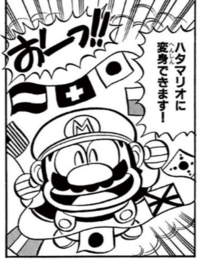Hata Mario: Difference between revisions
m (Bot: Automated text replacement (-(\|[\n ]*)character([\n ]*=) +\1applies_to\2)) |
m (Text replacement - "(\| *)Jap([RMCN\d]* *=)" to "$1Jpn$2") |
||
| (5 intermediate revisions by 4 users not shown) | |||
| Line 5: | Line 5: | ||
|first_appearance=''[[Super Mario-kun]]'' [[Super Mario-kun Volume 1|volume 1]] (1991) | |first_appearance=''[[Super Mario-kun]]'' [[Super Mario-kun Volume 1|volume 1]] (1991) | ||
|powers=Flying | |powers=Flying | ||
|applies_to=[[Mario]], [[ | |applies_to=[[Mario]], [[Paragaloomba|Flying Goomba]], [[Koopa Paratroopa]], [[Para-Beetle]]}} | ||
'''Hata Mario''' | '''Hata Mario''' is a transformation that [[Mario]] comes across in ''[[Super Mario-kun]]'' [[Super Mario-kun Volume 1|volume 1]]. | ||
In the hypothetical ''Super Mario Bros. 5'', Mario learns that the flying enemies now use signal/wind flags (one red and one white) instead of wings. Mario can use them as well by obtaining Hata for himself. While transforming into Hata Mario, Mario gets surrounded by different national flags. | In the hypothetical ''Super Mario Bros. 5'', Mario learns that the flying enemies now use signal/wind flags (one red and one white) instead of wings. Mario can use them as well by obtaining Hata for himself. While transforming into Hata Mario, Mario gets surrounded by different national flags. | ||
Mario uses the Hata to then reach a pair of flying enemies and defeats them by ordering them to imitate his gesture, raising one flag, then the other, until they cannot keep the pace anymore (similar to the ''[[Mario Party]]'' minigame [[Shy Guy Says]]), falling to the ground. Mario uses this transformation until he comes across a wall that does not let him skip the level by flying. | Mario uses the Hata to then reach a pair of flying enemies and defeats them by ordering them to imitate his gesture, raising one flag, then the other, until they cannot keep the pace anymore (similar to the ''[[Mario Party]]'' minigame [[Shy Guy Says]]), falling to the ground. Mario uses this transformation until he comes across a wall that does not let him skip the level by flying. | ||
==Names in other languages== | |||
{{Foreign names | |||
|Jpn=ハタマリオ | |||
|JpnR=Hata Mario | |||
|JpnM=Flag Mario | |||
|Fre=Collectionneur de Drapeau<ref>[[Super Mario-kun|Super Mario Manga Adventures]] Volume 1, page 183</ref> | |||
|FreM=Flag Collector | |||
}} | |||
==References== | |||
<references/> | |||
{{Mario forms}} | {{Mario forms}} | ||
[[Category:Mario forms]] | [[Category:Mario forms]] | ||
[[Category:Super Mario-kun]] | [[Category:Super Mario-kun]] | ||
Latest revision as of 11:35, January 7, 2025
The title of this article is official, but it comes from a non-English source.
If an acceptable English name is found, then the article should be moved to the new title.
| Hata Mario | |
|---|---|

| |
| Applies to | Mario, Flying Goomba, Koopa Paratroopa, Para-Beetle |
| Item needed | Hata |
| Power(s) given | Flying |
| First appearance | Super Mario-kun volume 1 (1991) |
Hata Mario is a transformation that Mario comes across in Super Mario-kun volume 1.
In the hypothetical Super Mario Bros. 5, Mario learns that the flying enemies now use signal/wind flags (one red and one white) instead of wings. Mario can use them as well by obtaining Hata for himself. While transforming into Hata Mario, Mario gets surrounded by different national flags.
Mario uses the Hata to then reach a pair of flying enemies and defeats them by ordering them to imitate his gesture, raising one flag, then the other, until they cannot keep the pace anymore (similar to the Mario Party minigame Shy Guy Says), falling to the ground. Mario uses this transformation until he comes across a wall that does not let him skip the level by flying.
Names in other languages[edit]
| Language | Name | Meaning | Notes |
|---|---|---|---|
| Japanese | ハタマリオ[?] Hata Mario |
Flag Mario | |
| French | Collectionneur de Drapeau[1] | Flag Collector |
References[edit]
- ^ Super Mario Manga Adventures Volume 1, page 183